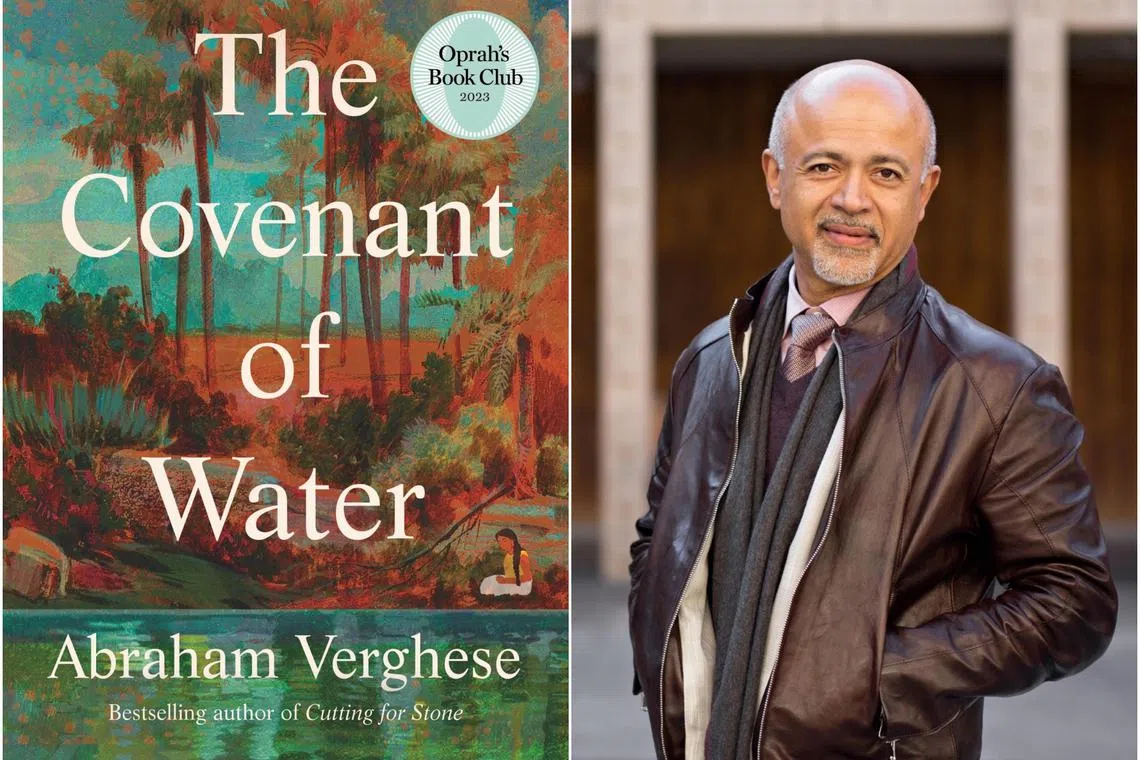Book review: Watery saga The Covenant Of Water uses medicine to combat drowning curse in an Indian village
Sign up now: Get ST's newsletters delivered to your inbox

Best-selling author Abraham Verghese's The Covenant Of Water is his first book in over a decade.
PHOTOS: PANSING BOOKS, JASON HENRY
Follow topic:
The Covenant Of Water
By Abraham Verghese amzn.to/435gCKh
Fiction/Grove Press/Paperback/724 pages/$36.54/Amazon Books (
5 stars
Best-selling author Abraham Verghese’s first book in over a decade begins with the tears of a mother and daughter.
“The saddest day of a girl’s life is the day of her wedding,” he writes – and Mariamma, 12, is about to be married to a much older man in South India in 1900.
She will be ripped from her mother’s bosom to learn the rhythms of self-contained Parambil, a village in Kerala, though she soon discovers a strange affliction.
Her sagely husband prefers the height of treetops to being transported in a raft. The eyes of her son, Jojo, roll uncontrollably in their sockets when she pours water over him for a bath.
Thus begins a slice-of-life, multi-generational tale full of reverence and compassion for the way people handle tragedy and cope with a condition they cannot fully understand.
At more than 700 pages and spanning 77 years, Verghese’s saga contains many permutations of disease – from leprosy to cretinism that freezes a beloved child forever in her infancy.
It is about the wonders and limits of medicine, the space for faith and prayer, and areas where the two intersect.
As a physician, Verghese is especially attuned to these quiet and desperate moments of skill and hope. He writes surgical operations as concentrated doses of high drama.
To him – and the inhabitants of Parambil – the line between medicine and magic is thin. For example, a crazed man slashing his wife in a fit of possession might be the result of atropine poisoning from smoking too many asthma cigarettes.
There is an excellent scene at a Christian convention where the Indian translator of an American charismatic pastor takes over the message to call for donations to a new hospital. Sometimes, the advent of science requires faith – literally.
But The Covenant Of Water is also much more, laying bare India’s complicated relationship with caste and the performative superiority of Europeans, embodied in the flawed character of Digby Kilgour, a Catholic Scottish doctor who finds himself oppressed in Glasgow but the oppressor in India.
The length of the book gives Verghese licence to branch into an entertaining love scandal taking place entirely within the colonial class a la English writer William Somerset Maugham, which ends in political intrigue and unexpected mutilation.
Digby’s life is one that will intersect with the Parambil crew only after 272 pages in this layered saga, then flits in and out for a finale that decentres the narrative from Parambil in a way that feels slightly unnecessary.
There may be comparisons to draw here with English writer Graham Swift’s 1983 novel Waterland, in which the watery fenlands of Eastern England are a constant source of threat.
Verghese’s landscape is less overt but more sophisticated. Here, the water that drowns is also the water that permits daring escapes, a source of ablution and a reminder that, like bodies of water, no one truly stands alone.
In sweeping prose that sometimes resembles incisive sketches, Verghese has created an Indian story filled with graceful, strong and funny characters.
Their lives offer a simple antidote to the unpredictable gales of history: “Whatsoever thy hand findeth to do, do it with thy might.”
The rest is about making peace with the result.
If you like this, read: Midnight’s Children by Salman Rushdie (Random House, 2006, $28.16, Amazon, go to amzn.to/3qWOZ8M
This article includes affiliate links. When you buy through them, we may earn a small commission.


